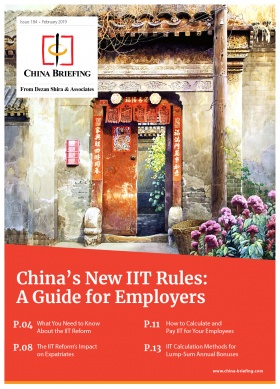China to Cut US$45 Billion in Fees and Tariffs
China will cut a variety of charges and fees for businesses and individuals as the government seeks to ease the pressure of a slowing economy and trade war with the US.
The cuts, which were decided by the State Council at a meeting held on April 3, will lower costs by a total of RMB 300 billion (US$45 billion) in 2019.
Although the cuts will not have a significant effect on the health of the economy, it will help to lower financial strains for qualified businesses, if only slightly.
Cutting fees for businesses and individuals
At the meeting, the State Council decided on cuts to a wide variety of fees and charges, ranging from power rates to bureaucratic charges.
According to the State Council, China will cut:
- Utility rates for general industrial and commercial businesses by 10 percent;
- Average broadband service rates for SMEs by 15 percent;
- Average mobile internet service rates for SMEs by more than 20 percent;
- Charges on real estate registration, effective July 1, 2019;
- Ownership registration fees for real estate from RMB 550 (US$82) to RMB 80 (US$12) each;
- Registration fees for the continued use of trademarks from RMB 1,000 (US$149) to RMB 500 (US$74);
- Payments by airline companies to the civil aviation development fund and national major water conservancy construction fund by half; and
- Charges for national cultural programs by half until the end of 2024.
Besides the above areas, the State Council said that it would reduce electricity and logistics costs, reduce or abolish various railway and port charges, and lower costs for passports, among other areas.
Additionally, the State Council announced cuts to personal postal tax rates for two categories of goods:
- Category One, which includes products such as books, magazines, computers, food and beverage, furniture, and drugs, will be lowered from 15 percent to 13 percent; and
- Category Two, which includes products such as sporting goods and textiles, will be lowered from 25 percent to 20 percent.
The new postal tax rates came into effect on April 9, 2019.
Easing the strain on businesses
For the most part, the State Council’s fee reductions are primarily aimed at easing the financial strains that companies – and to a lesser extent, individuals – are facing as China’s economy slows.
Although the total amount of RMB 300 billion (US$45 billion) is fairly significant, in reality the benefits are likely to be felt mostly around the edges. Several of the fee reductions are specific to certain services that only some businesses encounter, so the total benefit to any individual enterprise might not be particularly substantial.
Nevertheless, reductions to fees like power and internet rates can have tangible benefits for qualified enterprises.
On the other hand, while the cuts to fees are mostly geared towards lowering financial burdens, the postal tax cuts are more designed to encourage consumption.
Faced with tariffs from the US amid the trade war, over the past year China has sped up its plans to cut tariffs on foreign products. The latest postal tax cuts are another small step in executing this policy.
About Us
China Briefing is produced by Dezan Shira & Associates. The firm assists foreign investors throughout Asia from offices across the world, including in Dalian, Beijing, Shanghai, Guangzhou, Shenzhen, and Hong Kong. Readers may write to china@dezshira.com for more support on doing business in China.
- Previous Article China Labor Market: Hiring Costs, Job Preferences, Talent Acquisition
- Next Article China is Relaxing Hukou Restrictions in Small and Medium-Sized Cities







